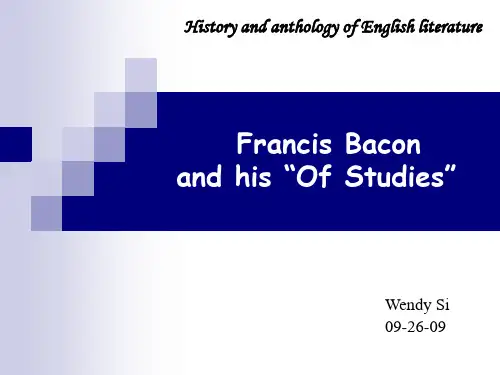FrancisBaconOf Truth常州大学学生作业33页PPT
- 格式:ppt
- 大小:6.19 MB
- 文档页数:33
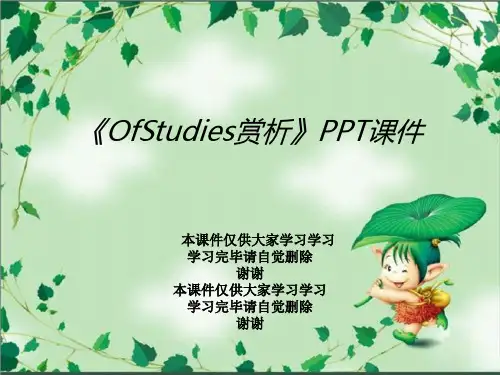
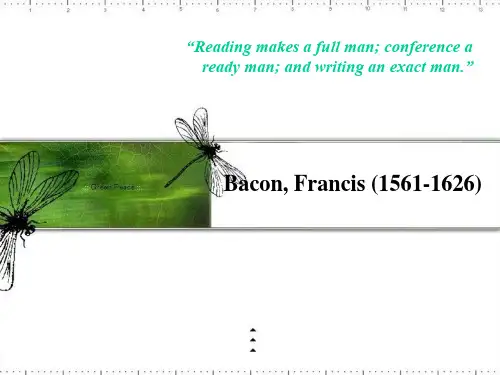
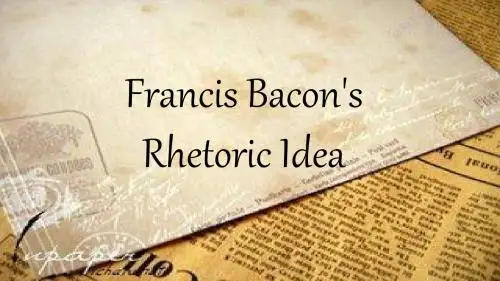
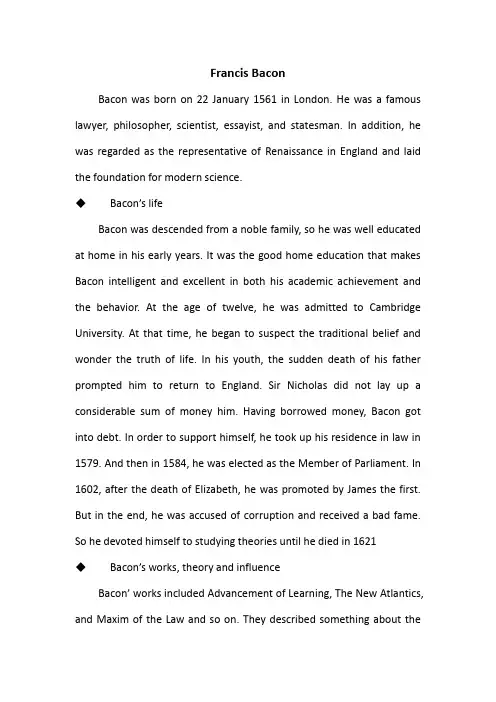
Francis BaconBacon was born on 22 January 1561 in London. He was a famous lawyer, philosopher, scientist, essayist, and statesman. In addition, he was regarded as the representative of Renaissance in England and laid the foundation for modern science.◆ Bacon’s lifeBacon was descended from a noble family, so he was well educated at home in his early years. It was the good home education that makes Bacon intelligent and excellent in both his academic achievement and the behavior. At the age of twelve, he was admitted to Cambridge University. At that time, he began to suspect the traditional belief and wonder the truth of life. In his youth, the sudden death of his father prompted him to return to England. Sir Nicholas did not lay up a considerable sum of money him. Having borrowed money, Bacon got into debt. In order to support himself, he took up his residence in law in 1579. And then in 1584, he was elected as the Member of Parliament. In 1602, after the death of Elizabeth, he was promoted by James the first. But in the end, he was accused of corruption and received a bad fame. So he devoted himself to studying theories until he died in 1621◆ Bacon’s works, theory and influenceBacon’ works included Advancement of Learning, The New Atlantics, and Maxim of the Law and so on. They described something about thephilosophy, law, science and so on. He tried to show us the truth of the nature and the importance of knowledge and science. He separated theology from scientific observations and experiments, thus making a great step forward in science and put forward his own theory called Bacon’s theory, which have an great influence in the development of science.Bacon has also put forward a lot of famous sayings. I really appreciate one of his saying--Reading makes a full man, conference a ready man, and writing an exact man. It is exactly true at least for me. I always believe that the more we read the more full our lives are.。
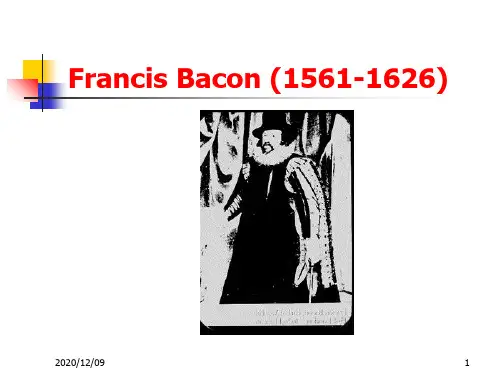
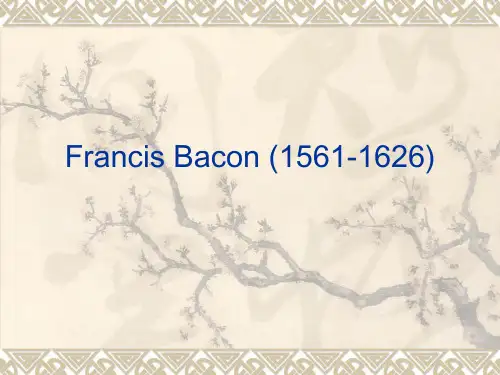
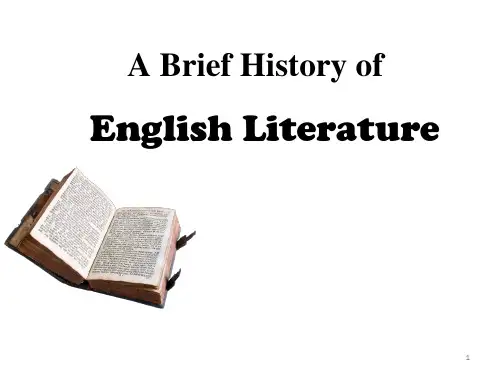
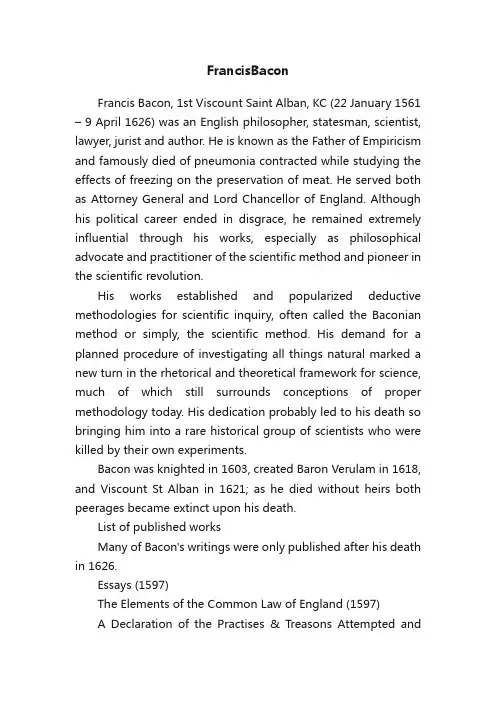
FrancisBaconFrancis Bacon, 1st Viscount Saint Alban, KC (22 January 1561 – 9 April 1626) was an English philosopher, statesman, scientist, lawyer, jurist and author. He is known as the Father of Empiricism and famously died of pneumonia contracted while studying the effects of freezing on the preservation of meat. He served both as Attorney General and Lord Chancellor of England. Although his political career ended in disgrace, he remained extremely influential through his works, especially as philosophical advocate and practitioner of the scientific method and pioneer in the scientific revolution.His works established and popularized deductive methodologies for scientific inquiry, often called the Baconian method or simply, the scientific method. His demand for a planned procedure of investigating all things natural marked a new turn in the rhetorical and theoretical framework for science, much of which still surrounds conceptions of proper methodology today. His dedication probably led to his death so bringing him into a rare historical group of scientists who were killed by their own experiments.Bacon was knighted in 1603, created Baron Verulam in 1618, and Viscount St Alban in 1621; as he died without heirs both peerages became extinct upon his death.List of published worksMany of Bacon's writings were only published after his death in 1626.Essays (1597)The Elements of the Common Law of England (1597)A Declaration of the Practises & Treasons Attempted andCommitted by Robert, late Earl of Essex and his Complices (1601) Francis Bacon His Apology, in Certain Imputations Concerning the late Earl of Essex (1604) Certain Considerations Touching the Better Pacification and Edification of the Church of England (1604)The Proficience and Advancement of Learning (1605)Cogitata et Visa (Thoughts and Conclusions; 1607)Redargutio Philosphiarum (The Refutation of Philosophies; 1608, published posthumously) Inquisitio Legitima de Motu (1608?, published 1653)De sapientia veterum liber (1609)Descriptio Globi Intellectus (1612)Thema Coeli (1612, published 1653)The Charge of Sir Francis Bacon, Knight, the King's Attorney-General, Touching Duels (1614) The Wisdom of the Ancients (1619)De Principiis atque Originibus (1620, published 1653)Novum Organum (1620)The History of the Reign of King Henry the Seventh (1622) Historia Naturalis et Experimentalis (1623)[33]Apophthegms, New and Old (1625)The Translation of Certain Psalms (1625)New Atlantis (1626)De Augmentis Scientiarium (1623)Sylva Sylvarum (1623, published 1627)Scripta in naturali et universli philisophia (pub. 1653)Baconiana, Or Certain Genuine Remains Of Sr. Francis Bacon (pub. 1679)InfluenceBacon's ideas about the improvement of the human lot wereinfluential in the 1630s and 1650s among a number of Parliamentarian scholars. During the Restoration, Bacon was commonly invoked as a guiding spirit of the Royal Society founded under Charles II in 1660.[34][35]In the nineteenth century his emphasis on induction was revived and developed by William Whewell, among others.[36]John Milton (9 December 1608 – 8 November 1674) was an English poet, polemicist, and civil servant for the Commonwealth of England. He is best known for his epic poem Paradise Lost.He was a scholarly man of letters, a polemical writer, and an official serving under Oliver Cromwell. He wrote at a time of religious flux and political upheaval in England, and his poetry and prose reflect deep convictions and deal with contemporary issues, such as his treatise condemning censorship, Areopagitica. As well as English, he wrote in Latin and Italian, and had an international reputation during his lifetime. After his death, Milton's critical reception oscillated, a state of affairs that continued through the centuries. At an early stage he became the subject of partisan biographies, such as that of John Toland from the nonconformist perspective, and a hostile account by Anthony à Wood. Samuel Johnson wrote unfavourably of his politics as those of "an acrimonious and surly republican"; but praised Paradise Lost" "a poem which, considered with respect to design may claim the first place, and with respect to performance, the second, among the productions of the human mind". William Hayley's 1796 biography called him the "greatest English author".[1] He remains generally regarded "as one of the preeminent writers in the English language and as a thinker of world importance."[2]Charles John Huffam Dickens(pronounced /?t?ɑrlz ?d?k?nz/;7 February 1812 –9 June 1870) was the most popular English novelist of the Victorian era, and he remains popular, responsible for some of English literature's most iconic characters.[1] Many of his novels, with their recurrent concern for social reform, first appeared in magazines in serialised form, a popular format at the time. Unlike other authors who completed entire novels before serialisation, Dickens often created the episodes as they were being serialized. The practice lent his stories a particular rhythm, punctuated by cliffhangers to keep the public looking forward to the next instalment.[2] The continuing popularity of his novels and short stories is such that they have never gone out of print.[3]His work has been praised for its mastery of prose and unique personalities by writers such as George Gissing and G. K. Chesterton, though others, such as Henry James and Virginia Woolf, criticised him for sentimentality and implausibility.William Wordsworth (7 April 1770 –23 April 1850) was a major English Romantic poet who, with Samuel Taylor Coleridge, helped to launch the Romantic Age in English literature with the 1798 joint publication Lyrical Ballads.Wordsworth's magnum opus is generally considered to be The Prelude,a semiautobiographical poem of his early years which he revised and expanded a number of times. It was posthumously titled and published, prior to which it was generally known as the poem "to Coleridge." Wordsworth was Britain's Poet Laureate from 1843 until his death in 1850.Alfred Tennyson, 1st Baron Tennyson, FRS (6 August 1809 –6 October 1892), much better known as "Alfred, Lord Tennyson," was Poet Laureate of the United Kingdom during much of Queen Victoria's reign and remains one of the most popular poets in theEnglish language. Tennyson excelled at penning short lyrics, "In the valley of Cauteretz", "Break, Break, Break", "The Charge of the Light Brigade", "Tears, Idle Tears" and "Crossing the Bar". Much of his verse was based on classical mythological themes, such as Ulysses, although In Memoriam A.H.H. was written to commemorate his best friend Arthur Hallam, a fellow poet and fellow student at Trinity College, Cambridge, who was engaged to Tennyson's sister, but died from a cerebral hemorrhage before they were married. Tennyson also wrote some notable blank verse including Idylls of the King, Ulysses, and Tithonus. During his career, Tennyson attempted drama, but his plays enjoyed little success.Tennyson wrote a number of phrases that have become commonplaces of the English language, including: "Nature, red in tooth and claw", "'Tis better to have loved and lost / Than never to have loved at all", "Theirs not to reason why, / Theirs but to do and die", "My strength is as the strength of ten, / Because my heart is pure", "Knowledge comes, but Wisdom lingers", and "The old order changeth, yielding place to new". He is the second most frequently quoted writer in The Oxford Dictionary of Quotations after ShakespeareSir Isaac Newton FRS (4 January 1643 – 31 March 1727 [OS: 25 December 1642 – 20 March 1726])[1] was an English physicist, mathematician, astronomer, natural philosopher, alchemist, and theologian who is considered by many scholars and members of the general public to be one of the most influential people in human history. His 1687 publication of the Philosophi? Naturalis Principia Mathematica(usually called the Principia) is considered to be among the most influential books in the history of science, laying the groundwork for most of classical mechanics. In thiswork, Newton described universal gravitation and the three laws of motion which dominated the scientific view of the physical universe for the next three centuries. Newton showed that the motions of objects on Earth and of celestial bodies are governed by the same set of natural laws by demonstrating the consistency between Kepler's laws of planetary motion and his theory of gravitation, thus removing the last doubts about heliocentrism and advancing the Scientific Revolution.Newton built the first practical reflecting telescope[7] and developed a theory of colour based on the observation that a prism decomposes white light into the many colours that form the visible spectrum. He also formulated an empirical law of cooling and studied the speed of sound.In mathematics, Newton shares the credit with Gottfried Leibniz for the development of the differential and integral calculus. He also demonstrated the generalised binomial theorem, developed Newton's method for approximating the roots of a function, and contributed to the study of power series.Newton remains uniquely influential to scientists, as demonstrated by a 2005 survey of members of Britain's Royal Society asking who had the greater effect on the history of science and made the greater contribution to humankind, Newton or Albert Einstein. Royal Society scientists deemed Newton to have made the greater overall contribution on both.[8] Newton was also highly religious, though an unorthodox Christian, writing more on Biblical hermeneutics and occult studies than the natural science for which he is remembered today. The 100by astrophysicist Michael H. Hart ranks Newton as the second most influential person in history (below Muhammad and above Jesus).。


